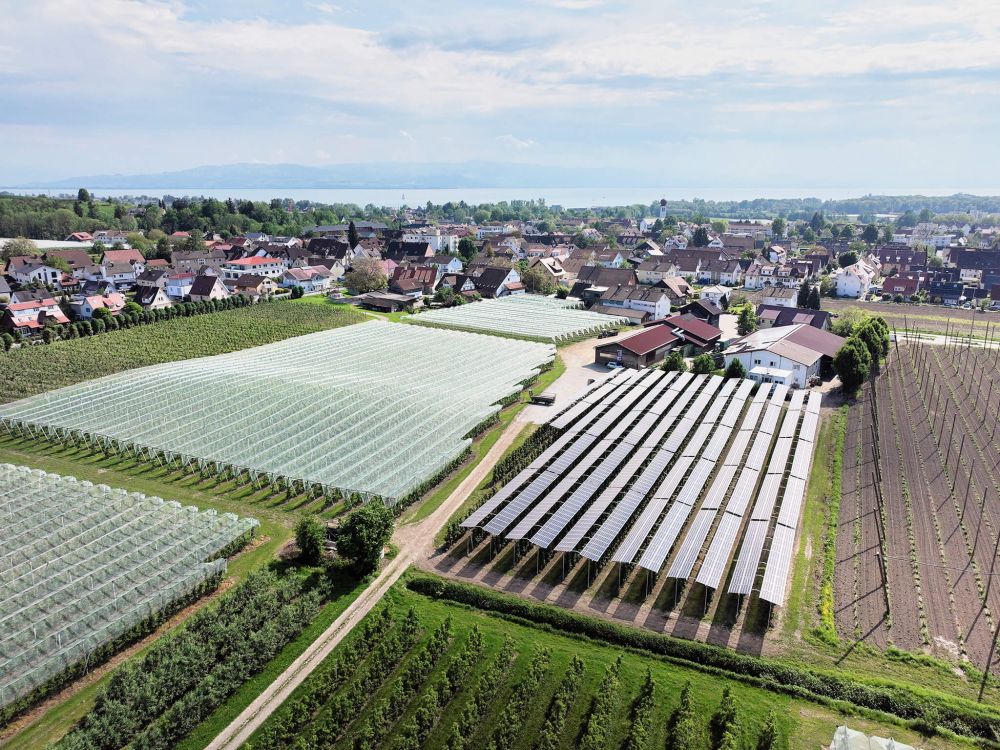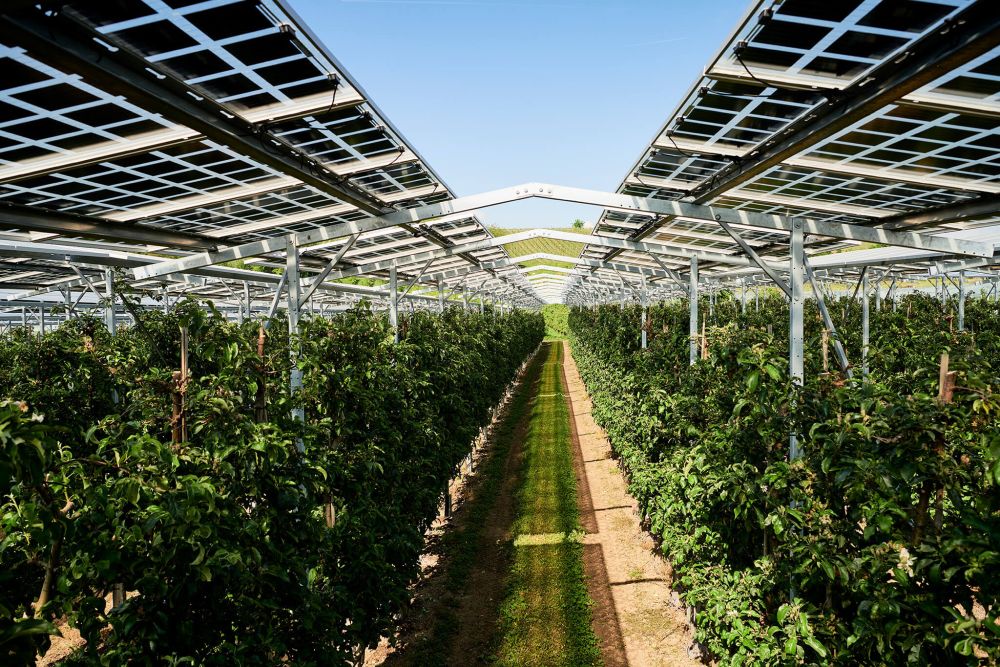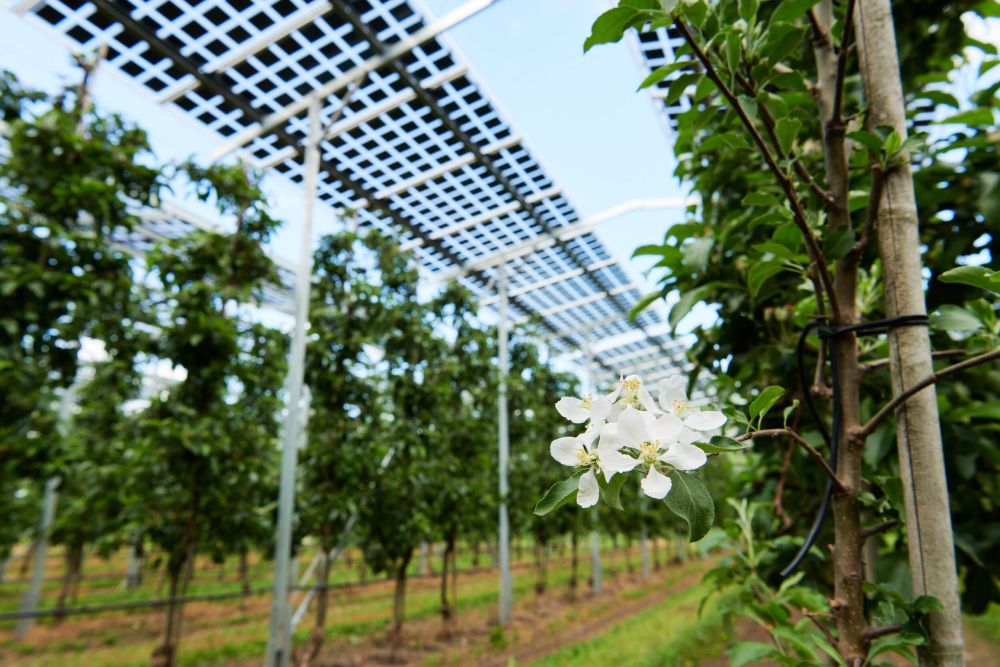| Duration: | 01/2022 - 12/2026 |
| Contracting Authority/ Sponsors: | Ministerium für Ernährung, Ländlichen Raum und Verbraucherschutz Baden-Württemberg (MLR) Ministerium für Umwelt, Klima und Energiewirtschaft Baden-Württemberg (UM) |
| Project Partners: | Project Partners: Fraunhofer-Institut für Solare Energiesysteme ISE (Fraunhofer ISE), Kompetenzzentrum Obstbau Bodensee (KOB), Landwirtschaftliches Technologiezentrum Augustenberg (LTZ Augustenberg), Staatliche Lehr- und Versuchsanstalt für Wein- und Obstbau Weinsberg (LVWO), Hochschule für öffentliche Verwaltung Kehl (HSK), Obsthof Bernhard, Obsthof Vollmer, Regionalwerk Bodensee (RWB), Associated Project Partners: Technische Werke Schussental (TWS), Intech GmbH & Co KG (Intech), Stadtwerke Oberkirch (SWO), Regionalverband Bodensee-Oberschwaben (RVBO), Regionalverband Südlicher Oberrhein (RVSO) |
| Website: | Agri-PV Baden-Württemberg |
| Project Focus: |
Model Region Agri-PV BaWü
First Implementation Phase of the Model Region Agri-Photovoltaics Baden-Württemberg



The Baden-Württemberg state government has set itself the goal of firmly establishing agri-photovoltaics as a land-efficient form of land use and specifically promoting its potential, especially in the area of special crops such as fruit growing. In a feasibility study funded by the Ministries of Environment, Climate and Energy as well as Food, Rural Areas and Consumer Protection, the implementation of eleven pilot plants was examined with regard to agricultural and technical aspects within the project "Model Region Agri-PV BaWü". Now, in a first implementation phase, five of these plants are to be planned, built and researched with the aim of identifying potentials and difficulties of Agri-PV and to advance the development of the new technology state-wide.
In the first implementation phase of the project "Model Region Agri-PV BaWü", Agri-PV will be researched in detail, with a focus on pome and soft fruit. Five Agri-PV plants with a total output of up to 1,700 kWp are to be built. A framework program, carried out by Fraunhofer ISE and Kehl University of Applied Sciences, enables, among other things, the coordination of the projects and deals with implementation possibilities of further locations and research questions as well as the legal framework. It is expected that the project will provide statements on the possible synergies of Agri-PV and will be decisive for the development of Agri-PV. The agricultural science institutes Kompetenzzentrum Obstbau Bodensee (KOB), Landwirtschaftliches Technologiezentrum Augustenberg (LTZ Augustenberg) and Staatliche Lehr- und Versuchsanstalt für Wein- und Obstbau Weinsberg (LVWO) will be responsible for a detailed analysis of plant growth under PV modules. The facilities in Ravensburg (KOB), Karlsruhe (LTZ Augustenberg) and Heuchlingen (LVWO) are mainly used for research purposes. Two further plants will be integrated into existing practical operations in Kressbronn on Lake Constance and in Nußbach. Technologically, different module types (standard, bifacial and semi-transparent modules with different light transmittances) will be tested in static and tracking systems. Each system will be customized to meet the needs of the crop. In addition, a project website is currently being developed with the goal of keeping the public informed of the progress of the project, as well as informing farmers of the process of building an Agri-PV system. In the future, the collected monitoring data will also be uploaded and made available to all.
- State promotes five model plants for agri-photovoltaics
- Construction of the first research plant of the "Model Region Agri-Photovoltaics Baden-Württemberg" starts
- First practical plant of the "Model Region Agri-Photovoltaics Baden-Württemberg" opened by Minister President Kretschmann (ise.fraunhofer.de)